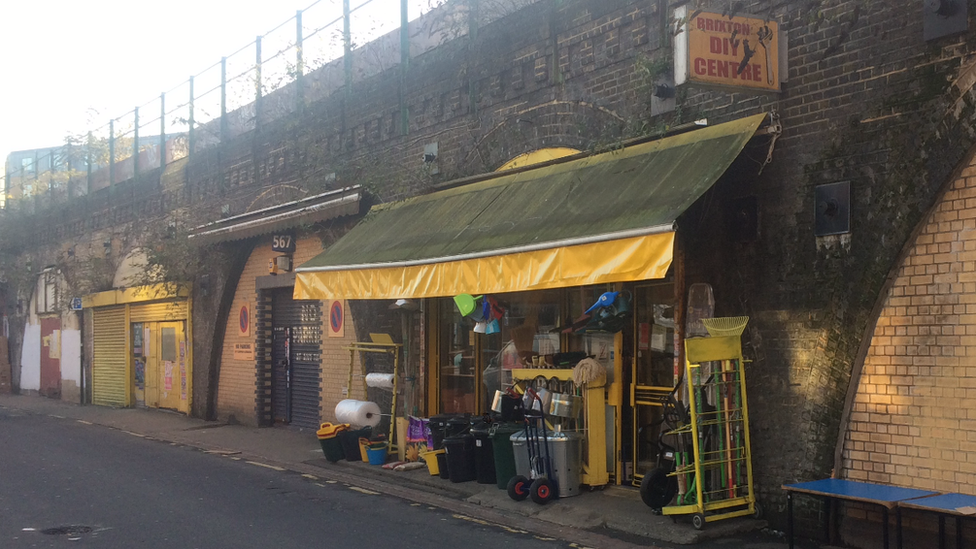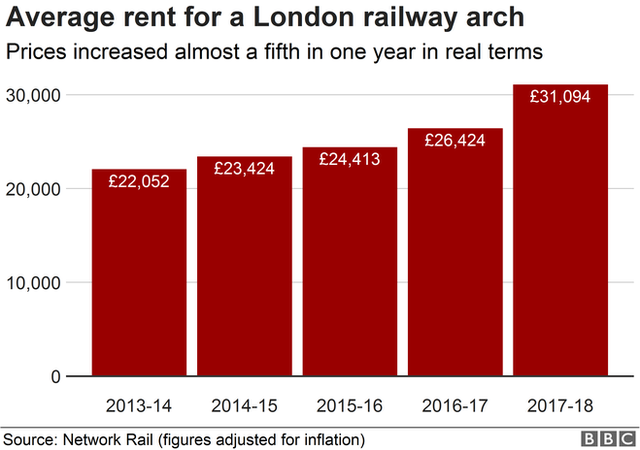Network Rail ‘exploiting railway arch businesses' with rent rises
- Published

Network Rail has been accused of "exploiting" small businesses by raising commercial rents in railway arches ahead of a property sale.
Figures have shown the average rent for a commercial space in London increased by almost 20% since April 2017.
The increase came months before Network Rail announced the sale of thousands of railway arches in a £1.46bn deal.
Network Rail said rent increases were usually due to local market conditions or its own investment.

A Freedom of Information request by the BBC revealed the average annual rent for a commercial space in London has increased from £22,052 in 2013-14 to £31,094 in 2017-18 - an increase of 41% in real terms.
The average rent increase in just the past financial year - up to 1 April 2018 - was 18%.
In September this year Network Rail announced, external the sale of 5,200 commercial units, predominantly converted railway arches, to property investors Telereal Trillium and private equity group Blackstone.
Graham Edwards, co-founder and chairman of Telereal, said the company was "tremendously excited" to work with the "entrepreneurial tenant base" of the arches.
"We intend to remain particularly sensitive to the small businesses that have been long-term tenants of the Network Rail estate," he said.
'Forced out of business'
Business people who rent space in the arches have said they were suspicious of the rent increases they have seen in recent years.
"When the sale of the estate was announced, many of us suspected our landlord is trying to force up our rents to make it a more attractive proposition to buyers or empty the arches so they are prime for development," said a spokesperson from the campaign group, Guardians of the Arches, external.
"There have been countless examples in recent years of arches tenants being hit with rent increases that force them out of business and, in many of these cases, their arches remain vacant to this day."
Guardians of the Arches told the BBC that in some cases rents were being increased by up to 400%.
Rents means firms aren't underneath the arches
Railway arches have been favoured by small independent businesses for decades for their cheap rents and open spaces.
But Rachel Munro-Peebles, the founder of FountLondon, which provides space for other start-up businesses as well as a variety of childcare services, said unfair rent increases were "killing small independent businesses" such as hers in Hackney.
Ms Munro-Peebles, whose business uses three railway arches, told the BBC: "We injected hundreds of thousands into this space, had the class use changed, and now they are penalising and charging us for this.
"It is exploitation, and neither Telereal, Network Rail, nor Blackstone care that we will have to serve six months' notice as we cannot sustain that type of rent. No business can."
She said small businesses such as hers regenerated disused areas and made them fashionable. Larger companies were benefitting from this regeneration at the expense of firms like hers, she said.
"They are killing small independent businesses. It should be stopped and the government should be made aware of this exploitation. These people should be made accountable for their decisions."
Network Rail said there were various reasons for rents increasing.
A spokesman said: "Increases in average rentals are primarily driven by the considerable investment we have made, together with a strong rental market particularly in and around London.
"We have invested around £70m since 2013 in our commercial estate during this period.
"Arches are increasingly popular for a range of uses and most of our tenants are small independent businesses.
"As with all commercial property, rent reviews happen on a periodic basis as outlined in tenants' leases, rent is also re-set when fixed term leases expire."